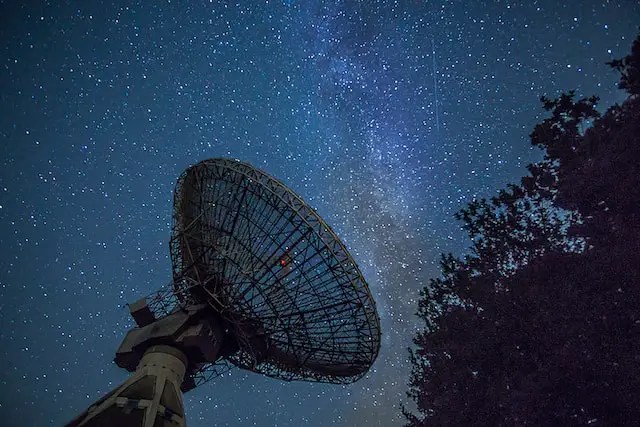Astronomy is the study of the physical universe beyond Earth, while cosmology is the study of its structure, history, and evolution. In other words, astronomy deals with what we can see, while Cosmology deals with what we can’t see.
What is astronomy?
(Photo by Abed Ismail on Unsplash )

Astronomy is the scientific study of celestial objects and phenomena beyond Earth’s atmosphere, including stars, planets, comets, asteroids, galaxies, and the universe as a whole. It is a natural science that seeks to understand the physical and chemical processes that govern the behavior and evolution of celestial objects, as well as the structure and history of the universe.
Astronomy involves the use of a wide range of observational and theoretical techniques, including telescopes, spacecraft, computer simulations, and mathematical models. It is a multidisciplinary field that draws on concepts and methods from physics, chemistry, geology, biology, and mathematics.
Astronomy has a long and rich history, with observations of celestial objects dating back thousands of years. Today, astronomers continue to make new discoveries and deepen our understanding of the universe through a wide range of research programs and projects
What is cosmology?
Photo by Stefan Widua on Unsplash

Cosmology is the scientific study of the origins, evolution, structure, and ultimate fate of the universe as a whole. It is a branch of astronomy that seeks to understand the large-scale structure and dynamics of the universe, including the distribution of matter and energy, the formation of galaxies and other cosmic structures, and the nature of dark matter and dark energy.
Cosmologists use a wide range of observational and theoretical tools to study the universe, including telescopes, satellites, computer simulations, and mathematical models. They also draw on concepts and methods from physics, astrophysics, and mathematics.
Cosmology has a long and fascinating history, with ideas about the nature of the universe and its origins dating back to ancient times. Today, cosmologists continue to make new discoveries and deepen our understanding of the universe through a wide range of research programs and projects, including studies of the cosmic microwave background radiation, galaxy surveys, and the search for gravitational waves.
How do they both study the universe?
Astronomy and cosmology both study the universe, but they do so in slightly different ways.
Astronomy is focused on studying the celestial objects and phenomena within the universe, such as stars, planets, galaxies, and black holes. Astronomers use telescopes and other instruments to observe and measure the properties of these objects, including their positions, movements, composition, temperature, and brightness. They also use theoretical models to explain the behavior of these objects, based on the known laws of physics and chemistry.
Cosmology, on the other hand, is focused on studying the universe as a whole, including its large-scale structure, history, and evolution. Cosmologists use a variety of tools and methods to study the universe, including observations of the cosmic microwave background radiation, which provides clues about the universe’s earliest stages, and galaxy surveys, which help to map the distribution of matter and energy throughout the universe. Cosmologists also use theoretical models to explain the observed properties and behavior of the universe, including the role of dark matter and dark energy.
Astronomy and cosmology are complementary fields that work together to provide a more complete understanding of the universe. Astronomy provides detailed observations of individual celestial objects, while cosmology provides a broader perspective on the universe as a whole. Together, they help to shed light on the mysteries of the cosmos and our place within it.
What are the Three types of astronomy?
There are three main types of astronomy:
- Observational astronomy
- Theoretical astronomy
- Applied astronomy
Observational astronomy
Observational astronomy is what most people think of when they think of astronomy. It involves using telescopes and other instruments to observe the night sky. Observational astronomers study things like the composition of stars, the formation of galaxies, and the nature of black holes.
Theoretical astronomy
Theoretical astronomy is the branch of astronomy that deals with the theoretical modeling of astronomical objects and phenomena. Theoretical astronomers use mathematical models to predict how astronomical objects will behave. They also use computer simulations to study the behavior of astronomical objects.
Applied astronomy
Applied astronomy is the branch of astronomy that applies the knowledge and techniques of astronomy to other fields. Applied astronomers use their knowledge of astronomy to solve problems in other fields, such as engineering and medicine.
However, there is significant overlap between the two fields, and many astronomers also work on cosmological research. Ultimately, both disciplines are concerned with understanding the nature of our universe and everything in it.
What are the types of cosmology?
There are several types of cosmology, which differ in their theoretical frameworks, assumptions, and methods of analysis. Here are some of the main types of cosmology:
Classical cosmology: Classical cosmology is the study of the universe using the principles of classical physics, such as Newtonian mechanics and thermodynamics. It was the dominant paradigm of cosmology until the 20th century.
Relativistic cosmology: Relativistic cosmology is the study of the universe using the principles of Einstein’s theory of general relativity. It describes the universe in terms of a four-dimensional space-time continuum and provides a more accurate description of gravity than classical physics.
Big Bang cosmology: Big Bang cosmology is the most widely accepted model of the universe’s origin and evolution. It posits that the universe began as a hot, dense state and has been expanding and cooling ever since. The theory is supported by a wide range of observational evidence, including the cosmic microwave background radiation and the observed distribution of galaxies.
Inflationary cosmology: Inflationary cosmology is a modification of the Big Bang theory that posits a brief period of exponential expansion in the early universe. The theory was developed to explain several observational puzzles in standard Big Bang cosmology, such as the uniformity of the cosmic microwave background radiation.
Multiverse cosmology: Multiverse cosmology is the study of the possibility that there are multiple universes, each with its own set of physical laws and properties. The theory is motivated by several problems in standard cosmology, such as the fine-tuning of physical constants and the lack of a natural explanation for the observed properties of the universe.
These are just a few examples of the many types of cosmology that exist. Cosmology is a constantly evolving field, and new theories and models are being developed all the time.
What is cosmologist in astronomy?
A cosmologist is a scientist who specializes in the study of the universe as a whole, including its origins, structure, and evolution. Cosmologists use a variety of tools and methods to study the universe, including observations of the cosmic microwave background radiation, galaxy surveys, and computer simulations.
Cosmologists work to develop and test theoretical models of the universe that explain its observed properties and behavior. These models often involve complex mathematical equations and simulations, and may require collaboration with other scientists in fields such as physics, astrophysics, and mathematics.
Cosmologists are often involved in research projects aimed at understanding some of the biggest questions in cosmology, such as the nature of dark matter and dark energy, the structure of the early universe, and the ultimate fate of the universe. They may work in academic or research institutions, government agencies, or private industry.
In short, cosmologists are astronomers who specialize in the study of the universe as a whole, using a range of observational, theoretical, and computational tools to deepen our understanding of the cosmos.
Who is father of cosmology?
The concept of cosmology, or the study of the universe as a whole, has been explored by many ancient cultures, including the Greeks, Egyptians, and Babylonians. However, the modern scientific study of cosmology began in the early 20th century with the development of the theory of general relativity by Albert Einstein.
Einstein’s theory provided a new understanding of the nature of gravity and the structure of space and time, which had profound implications for the study of the universe. In particular, it suggested that the universe could be described as a dynamic, evolving entity that could expand or contract over time.
While Einstein’s work laid the groundwork for modern cosmology, he is not usually considered the “father” of the field. Rather, that title is often given to Georges Lemaître, a Belgian priest and astronomer who was one of the first scientists to propose the theory of the Big Bang.
Lemaître’s work in the 1920s and 1930s showed that the observed expansion of the universe could be explained by a primordial explosion that occurred billions of years ago. This theory, which later became known as the Big Bang theory, revolutionized our understanding of the universe and set the stage for much of the research in cosmology that followed.
So, while there have been many contributors to the development of cosmology over the centuries, Georges Lemaître is often credited as the “father” of the modern scientific study of the universe.
Featured Image By – Greg Rakozy on Unsplash








